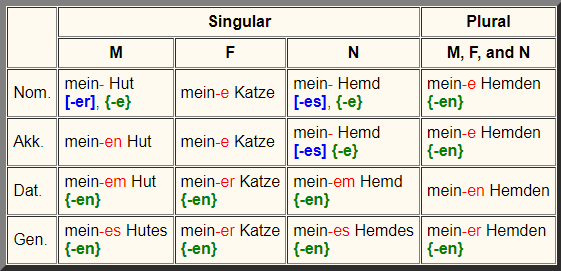Possessive Pronoun Endings of mein, dein, sein, ihr, Ihr, unser, euer, ihr
In this table, lone hyphens, --, are only to indicate the absence of any ending.
The ending gets changed to [-er] or [-es], when the Possesivpronomen is used as a noun with no article. Examples:
Ich sorge für mein Kind, sorgen Sie für Ihres! (Not: "... für Ihr!").
Ich stelle ihren Mann meinem vor (not marked blue in the Table, hence normal Possesivpronomen ending!)
Alle Hunde können bellen, unserer kann auch ohne zu bellen leben. (Not:"...unser kann auch ...")
When the Possessivpronomen is used as a noun with article, the endings in green{...} apply. Preferred is here the use of an -ig ending. Examples, showing the equivalence of both endings.
Er liebt die Seinen. - Er liebt die seinigen.
Ewig der Deine - Ewig der deinige
Tun Sie das Ihre! - Tun Sie das ihrige!
Der Hund ist der Meine. - Der Hund ist der meinige.
Note: Preferred use is that with -ig ending. This (i.e. "-ig") substantiated pronoun should not capitalized, according to dictionaries. See Duden 1 "Die Rechtschreibung" 18.Aufl. Examples:
Mische Dich nicht in fremde Dinge, aber die deinigen tue mit Fleiß! (Proverb)
Die Bäume im Nachbargarten blühen schön, die unsrigen sind noch nicht so weit.
Note - [e] can be dropped in the following forms:
uns[e]re, uns[e]res uns[e]rer;
eu[e]re, eu[e]res, eu[e]rer.
One [e] may be omitted in the following forms:
uns[e]r[e]m, uns[e]r[e]n;
eu[e]r[e]m; eu[e]r[e]n.
Further emphasis to ownership, abstract or real, is indicated by the use of all[er], dieser, or jener as demonstrative adjectives. Examples:
... all meines Besitzes;
Nur durch all[er] seine Kunst gelang es; (It succeeded only through all his personal skill)
In diesem ihrem eigenlichen Leben fand sie die größte Genugtuung;
Er bereicherte uns mit diesen seinen Worten. (He enriched us with these, his personal words)
Note: Ownership can be ambiguous or false, when expressed in the 3.Person. To rectify or uniquely establish some of the relationships, the demonstrative pronoun, dessen or deren, may have to be used. See also the next page. Dessen is only for male singular. Otherweise, only deren may be used. Examples:
Darf ich Ihnen Herrn Meier, seinen Sohn und seine Tochter vorstellen? (Daughter of Meier)
Darf ich Ihnen Herrn Meier, seinen Sohn und dessen Tochter vorstellen? (sun's daughter)
These are examples wher one can only resort to correctly reconstructing the original text's clearly expressed meaning, when translating to English.


 英语
英语 日语
日语 韩语
韩语 法语
法语 西班牙语
西班牙语 意大利语
意大利语 阿拉伯语
阿拉伯语 葡萄牙语
葡萄牙语 越南语
越南语 俄语
俄语 芬兰语
芬兰语 泰语
泰语 丹麦语
丹麦语 对外汉语
对外汉语

